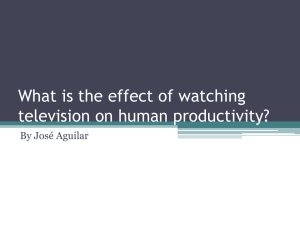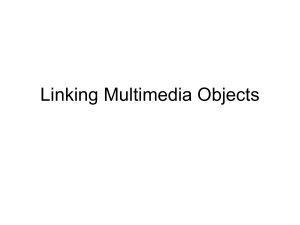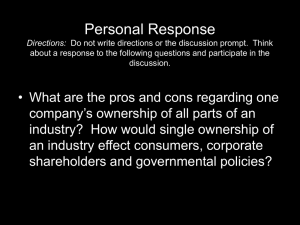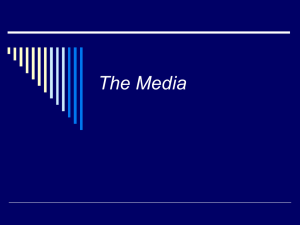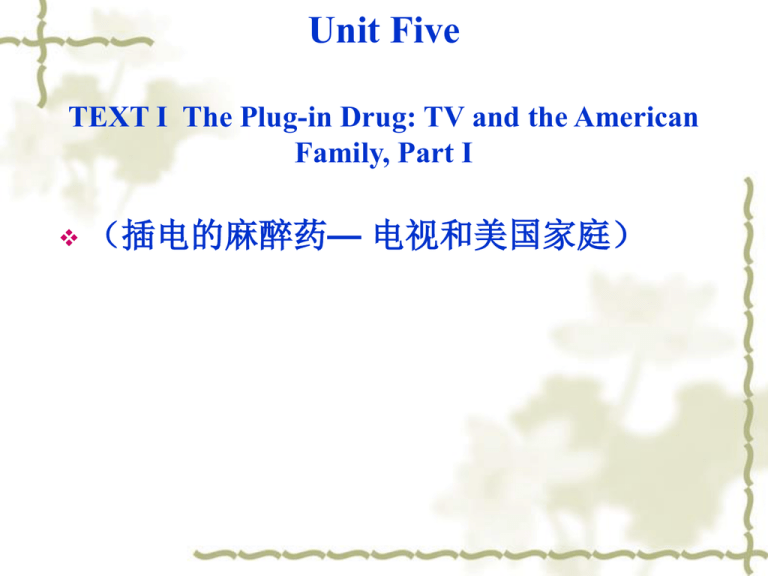
Unit Five
TEXT I The Plug-in Drug: TV and the American
Family, Part I
(插电的麻醉药— 电视和美国家庭)
Teaching aims
Use of quotations as an expository means
Cause and effect development in writing.
Cultivation of social awareness and critical
ability
Main and difficult teaching points:
relevant information; understanding the
thesis; text organization; text
comprehension; language points; the use of
quotations pattern in expository writing
Time allotment: 9 periods
Teaching Procedures:
I. Pre-reading Brainstorming:
1.What do you know about “drug” and “drug
taking”? How do you understand the title?
Drug in one sense is a habit-forming substance
one takes for pleasure or excitement. Harmful
drugs include tobacco, alcohol, cocaine, opium,
etc.
The plug-in drug is a term used by the author to
refer to TV which works when it is plugged in. TV
is compared to a drug because, on the one hand,
the American family has formed the habit of
watching TV at leisure time and, on the other
hand, TV has undesirable effects on the family.
Warming-up questions:
1.Do you like watching TV? Are you TV-addicted?
2.Do you agree with the author that TV has
harmful effects?
3.What roles do you assign to TV?
II. Comprehension:
1. Main Idea:
The domination of television has exerted
strong influence on the way of life of
many American families, diminishing
their daily activities and affecting the
sound growth of their children.
2. Purpose of writing and Tone:
To seriously demonstrate the dangers of
the domination of television in American
families
Background
1. About the author
Marie Winn
(1936, Prague,
Czechoslovakia )
Marie Winn, a journalist,
author and birdwatcher, is
known for her books and
articles on the birds of
Central Park, for her Wall
Street Journal ornithology
(scientific study of birds)
column, for her critical
coverage of television. She
is the author of The
playground Book, The Sick
Book, The Baby Reader,
and other books for
parents and children.
This selection is taken
from The Plug-in Drug,
published in 1977. In
2002, she added new
material to update the
study as The Plug-In
Drug: Television,
Computers, and
Family Life, published
on the 25th
anniversary of the
original book.
2.The development of TV industry
TV broadcasting began in the U.S. in 1941, and in
1946, after World War Ⅱended, TV began to grow
rapidly .By 1975, almost 127 million sets were in
use. By the 1970’s almost 100% of all wired
homes in the U.S. had at least one TV set. The
average American has his set turned on for about
6.5 hours each day. In fact, TV has become the
American’s eye and ears on the world
Development of TV
black-and-white television.
color television
Projection televisions
liquid-crystal display (LCD) technology or an array
of micro mirrors, also known as a digital light
processor (DLP).
Handheld television
Manufacturers have
also developed very
small, portable
television sets with
screens that are 7.6
cm (3 in) diagonally
across.
Discussion on TV
Group discussion and presentation in
class:
Positive effects of TV on family
Negative effects of TV on family
III. Organization of the text
An outline of the text’s organization
Early enthusiasm over TV as
a wonderful invention
Quotation 1-3 from early writers and
commentators to show the general view
in favour of TV as a new invention
Arising concern over
too much TV viewing
Para 6-8
Quotation 4 (para7) to illustrate a popular view
which helps to soothe the worrying parents
Criticism of TV’s negative effects
on family life
Para 9-14
Three more quotations (pa 10, 12, 13) to criticize how TV dominates family
life and diminishes interaction between parents and children.
Appeal for better family
Quoting from Times to stress the Para 15-end life
without TV importance of parent-children
communication
The ordering of the quotations reveals the
structure of the text. It also reflects how
people’s attitudes towards TV have changed
– beginning with enthusiastic admiration of
TV as a wonderful invention but ending with
strong criticisms of its negative effects on
the healthy way of family life
The organization of the text
A. Opening (Paragraph 1):
the introduction of television into American
society (cause)
B. Positive effects (as claimed in the early
years when television was introduced into the
average American family) (Paragraphs 2 – 5):
1. a wonderful improvement in the change
of children’s habits (Paragraphs 2 – 3)
2. a good means to bring the family together
(Paragraphs 4 – 5)
C. Negative effects (as perceived today)
(Paragraphs 6 – 13):
1. too much time devoted by children
to TV-watching (Paragraphs 6 – 7)
2. a general lack of communication
within peer groups (Paragraph 8)
3. a widening gap in the relations
between children and their parents
(Paragraphs 9 – 10)
4. traditional family concept being
challenged and culture changed
(Paragraphs 11 – 13)
D. Closing (Paragraphs 14 - 17):
1. impact on children (Paragraph 14):
a drastic change in their life and
personality; the process that transforms
children into people being hindered
2. impact on family and family life
(Paragraphs 15 – 17):
ever-loosening family ties
V. Key Points of the Text
Paragraph 1
… that has seen the medium become so
deeply ingrained in American life …:
TV has become an indispensable part of
American life, so much that it cannot be
done away with
ingrained: fixed so firmly and deeply that
it is difficult to remove
E.g.: an ingrained habit / belief /
prejudice/suspicion 固习(积习)/深刻信
念 / 根深蒂固的偏见/怀疑
medium: a way or means of giving
information,expressing one’s ideas,or
communicating with people.The belief
that one should work hard is ingrained in
our culture. TV is a medium for giving
information as well as for entertainment.
In our English classes,English is the
medium of instruction.
Paragraph 1
attain: succeed in getting something,
especially after some effort
E.g.: He attained his objectives / hopes
after much hard work.
A man of attainments (有造诣的人) is one
who has accomplished / achieved a great
deal.
我们的老师不到40岁就取得了正教授资格(WB,
pg. 49)
Our teacher attained full professorship
before he was forty.
safe from repossession: protected from
repossession, that is, a claim / a demand
made by the original owner to regain the
possession of …
…the television set has attained the rank
of a legal necessity, safe from
repossession in case of debt.
The television set has by law been
placed in the class of goods which are
necessary to life. That’s to say, the TV set
has become so important in life of a
family that its possession is guaranteed
by law. Even when a person is in debt, it
cannot be taken away from him by
whomever he owes a debt.
sufficient perspective: enough overview,
enough comprehensive point of view
a curious myopia afflicted those early
observers
myopia:
1)shortsightedness
2) inability to look into the future
afflict: cause to suffer in the body or
mind; trouble使疼痛、苦恼、烦恼
E.g.: John is afflicted with a chronic
headache.
Environmental pollution is afflicting
many cities and towns all over the world.
(WB. page 50)
He felt quite afflicted at (by) the bad
news.
A nightmare afflicts me from time to time.
a curious myopia afflicted those early
observers:
a strange shortsightedness troubled
those early observers
wondrous: This is a formal or literary
word. Wonderful is the more usual word.
Why does Winn accuse the early
observers of myopia?
The early observers only saw the
favorable effects of TV and none of them
was sufficiently far-sighted to predict the
negative effects of TV in the future. That
is why they are accused of myopia, i. e. ,
short-sightedness.
Paragraph 2
asset: the property of a person,
company, etc., especially that has
value and that may be sold to pay a
debt 资产;有用的东西
E.g.: a statement of assets and
liabilities 资产负债表
He is a national asset. 他是国宝。
Wit is his chief asset. 机智是他的
主要优点。
Good health is a great asset.
Paragraph 5
invariably : always, without exception
E.g. 电视上的卡通片一直是孩子们的最爱.
Cartoons on TV remain invariably
children’s favorite.
他总是迟到.
He is invariably late for school.
Paragraph 5
perch:
1) (of a bird) to come to rest from flying (鸟)
飞落,暂栖
E.g.:麻雀在树枝上憩息了一会儿。
The sparrow perched on the branch for a
moment or two.
2) (of a person) sit, esp. on sth high or narrow
perch on high stools at the bar
More than 2000 spectators sat on wooden
benches or squatted on the grass, perched on
the tops of parked cars or gawked from
windows.
take in: to notice or see (something) fully
注意到;用敏锐的目光看;看出
E.g.:她的眼睛只盯着电话机,其他一律视而
不见。
Her eyes were taking in nothing but the
telephone.
他一眼看出情况不对,决定马上离开。
He took in what was happening and
decided to get away quickly.
soothe使(某人,其神经,其情绪)平静, 安慰, 使
(痛苦,疼痛)缓和或减轻
reassure使...安心, 再保证, 使...恢复信心, 打
消...的疑虑
advent:coming or arrival of something
important
Stint:stretch, a period of time which you
spend doing a particular job or activity
or working in a particular place. EG: I
had first met her during my stint in
Washington.
I arrived at the university for a three
month stint as a lecturer.
Regiment: very strictly controlled,used
showing disapproval:the regimented
lifestyle of the industrial world.
Spontaneous: unplanned,not
prearranged.
On the spur of the moment: on a sudden
impulse.
She gave a clever answer to the tricky
question ~.
Mediating: acting as a go-between
concerning the needs of both the adults
and children,act as a peacemaker.
amiss:错误地, 有缺陷地, 不恰当地, 歪, 偏
有故障, 有问题
speak amiss 说得不恰当 Everything
goes amiss with him, he has certainly
bad luck. 他事事不如意, 运气真不好。
Shunt:shunt sb. from a first class hotel
to a third class lodging.
Conjure up memories: bring memories into
mind
At the alumni meeting校友会,everyone
present conjured up scenes at school in the
past.
fabric: 构造,织物: Many materials formed
the fabric of his character.
Render(fml):cause sth. to…
He hoped his savings would be a backlog
against unemployment.
a backlog of work(mail,criminal cases)
Difficult sentences
A quarter of a century … and ordinary part of
daily life.
the structure:
--- main clause:
television viewing has
become an inevitable and ordinary part of
daily life.
--- adverbial phrase: a quarter of a century
after the introduction of television into
American society
--- apposition: a period that has been seen
the medium.... and the like
Comprehension questions
Can you infer from the first sentence when
television was first introduced into American
society?
--- A quarter of a century after the
introduction of TV: In the early 50’s, if we
take 1977, the date of the publication of
Winn’s book The Plug-In Drug, as the
basis of inference. Many reference books
give an earlier date, though, as is shown in
note 1 – public TV broadcasting began in
the US in 1941, and in 1946 after World
War II ended.
Difficult sentences
a period that has seen the medium become
so deeply ingrained in American life that in at
least one state the television set has attained
the rank of a legal necessity, safe from
repossession in case of debt along with
clothes, cooling utensils, and the like.
--- The TV set has become so important in
the life of a family that its possession is
guaranteed by law. Even when a person is
in debt, it cannot be taken away from him
by whomever he owes a debt as clothes,
cooking utensils, and the like.
Difficult sentences
separate the activity of watching television from the actual
content it offers the viewer
--- People at that time didn’t realize the effects that TV
would exert on its viewer. Watching TV was just
considered as an activity of sitting before the
screen. Nothing was taken into account as to what
they were watching, e.g. whether there was too
much violence or sex shown on the screen, which
would bring about more juvenile delinquency in the
country. Small attention was given to the
influences of TV programs.
Comprehension questions
Why does Winn accuse
observers of myopia?
the
early
--- The early observers only saw the
favorable effects of TV (favorable,
beneficial, wondrous) and none of them
was sufficiently far-sighted to predict the
negative effects of TV in the future. That’s
why they are accused of myopia, i.e.,
short-sightedness.
Difficult sentences
It deeply influences that ‘pattern of influences’ that
is meant to ameliorate its effects.
--- that “pattern of influences”: as shown in lines 3536, i.e. positive influences on the home, the peer
group, the school, the church, and culture
--- TV exerts great negative effects on the home, the
peer group, the school, the church, and culture.
Difficult sentences
The peer group has become televisionoriented, and much of the time children
spend together is occupied by television
viewing.
--- Children have become television
addicts, devoting much of the time when
they are together to watching TV.
Comprehension questions
Provide examples to illustrate Culture
generally has been transformed by
television.
--- Spring Festival Gala, etc.
Difficult sentences
It is improper to assign to television the subsidiary
role its many apologists辩护者, 辩证者, 护教论者(too
often members of the television industry) insist it play.
--- The television producers (= members of the
television industry ) think the role that TV plays is
subsidiary, not the most important role, so they
apologize. By saying so, they actually deny the great
ill-effects of TV on people. What they acknowledge
and insist is that TV is only of minor importance in
influencing children’s lives. All the manufacturers
claim the high benefits to the consumers besides the
high quality of their products other than the harms
and negative effects.
Difficult sentences
Television is not merely one of a number of
important influences upon today’s child. Through
the changes it has made in family life, television
emerges as the important influence in children’s
lives today.
--
Television is not simply just one among
many important factors that may influence a
child today. Television has brought about
great changes in family life, playing the
dominant role in shaping the lives of children
today. To put it simple, television does not
only exert great influences on today’s child,
but also their lives since it influences the
family life.
Comprehension questions
How do you interpret the seemingly
paradoxical statement “While it has, indeed,
kept the members of the family from
dispersing, it has not served to bring them
together”?
--
The TV helps to keep all the family members
in the house in a physical sense. But they
are not really doing things together. Instead,
they watch their own favorite programs with
little interaction between them. In this sense
the TV undermines the relationships
between family members.
Difficult sentences
The television set casts its magic spell, freezing
speech and action, turning the living into silent
statues so long as the enchantment lasts.
--
Once TV set is plugged in, it functions as a
magician, freezing the speech and action,
keeping the viewer stationery before the
screen until ‘Good-bye’ is shown. Or, the
television has its magic power over people.
As soon as the television is on, people stop
talking and doing anything else, growing to
be lifeless statues before the TV screen.
They will remain so till the end of the
program.(exaggeration)
Difficult sentences
The primary danger … lies not so much in
the behavior it produces as in the behavior
it prevents… through which much of the
child’s learning takes place and through
which his character is formed.
--- What is the behavior that TV screen
produces?
--- What is the behavior that TV screen
prevents?
--
Which is more dangerous, the behavior TV
screen produces or the behavior it prevents?
Why?
--- Watching TV is itself dangerous, but what
is more dangerous is that it prevents the
talks, the games, the family festivities and
arguments. Children can learn a lot from all
these activities, and they form their
character to some extent in the process of
these activities.
Difficult sentences
Turning on the television set can turn off
the process that transforms children into
people.
--- The moment a child sits down to watch
television is the moment his growth
towards maturity is suspended. i.e.
Watching TV all the time prevents a
child from growing into maturity.
Difficult sentences
Keeping a family sane means mediating
between the needs of both children and
adults.
--- If we want to make a family in possession
of good relations, we should meet the needs
of both children and their parents.
Comprehension questions
How are children’s demands satisfied?
--- Their demands are usu. shunted away (= kept
away, prevented, evaded). They are considered as
troublesome if they raise any demands.
How are adults’ demands satisfied?
--- Adults’ demands are always satisfied.
Parents will do whatever a childless couple
can.
What
is the significance of meeting
children’s needs?
--- It is children’ various demands for their
families that help them to grow mature, and
it is the way parents satisfy their children’s
demands that helps to make their
relationships closer.
Comprehension questions
How do you understand the last
sentence?
--- If family members always mind their
individual business without any time to
do something together so as to have
some shared experiences, the family is,
then, anything other than / nothing but
a care-taking institution.
Post-reading discussion
The future of TV,computer
Television, Computer Industries Collide Over
Digital TV
Negative effects of TV on
people’s life
Culture
generally has been
transformed by television.
Traditional family concept being changed and
culture changed.
A widening gap in the relations between
children and their parents
Assignment:
1.Write an essay about the best way for
parents to educate their children.(about 300
words).
2.Write a paper, focusing on the positive
effects brought about by introduction of
television or internet into the Chinese families.
( hand in when the whole passage is finished)
Reading aloud the passage
3.Going over the key points and memorizing
the new words




